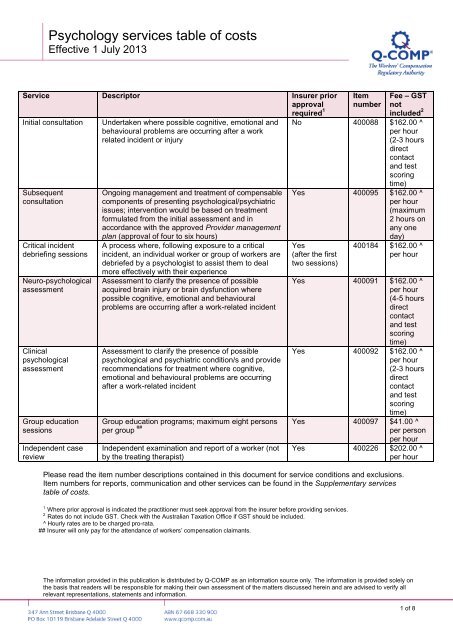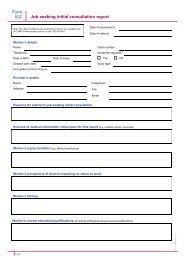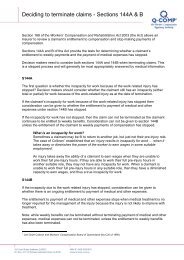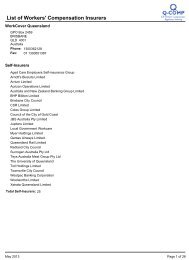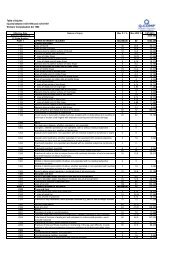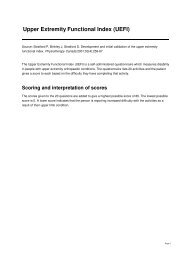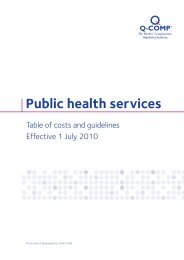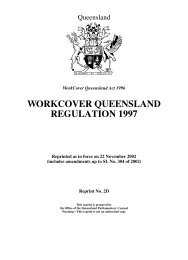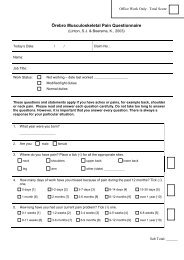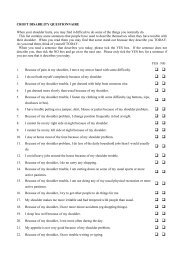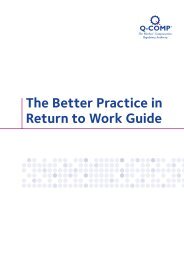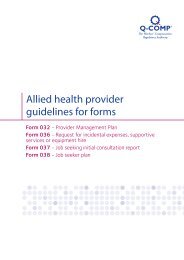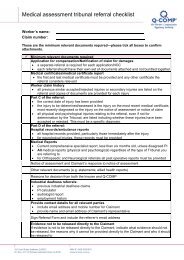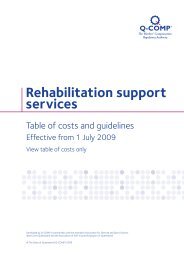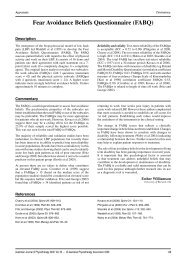Psychology services table of costs - Q-Comp
Psychology services table of costs - Q-Comp
Psychology services table of costs - Q-Comp
You also want an ePaper? Increase the reach of your titles
YUMPU automatically turns print PDFs into web optimized ePapers that Google loves.
<strong>Psychology</strong> <strong>services</strong> <strong>table</strong> <strong>of</strong> <strong>costs</strong><br />
Effective 1 July 2013<br />
Service Descriptor Insurer prior<br />
approval<br />
required 1<br />
Initial consultation<br />
Subsequent<br />
consultation<br />
Critical incident<br />
debriefing sessions<br />
Neuro-psychological<br />
assessment<br />
Clinical<br />
psychological<br />
assessment<br />
Group education<br />
sessions<br />
Independent case<br />
review<br />
Undertaken where possible cognitive, emotional and<br />
behavioural problems are occurring after a work<br />
related incident or injury<br />
Ongoing management and treatment <strong>of</strong> compensable<br />
components <strong>of</strong> presenting psychological/psychiatric<br />
issues; intervention would be based on treatment<br />
formulated from the initial assessment and in<br />
accordance with the approved Provider management<br />
plan (approval <strong>of</strong> four to six hours)<br />
A process where, following exposure to a critical<br />
incident, an individual worker or group <strong>of</strong> workers are<br />
debriefed by a psychologist to assist them to deal<br />
more effectively with their experience<br />
Assessment to clarify the presence <strong>of</strong> possible<br />
acquired brain injury or brain dysfunction where<br />
possible cognitive, emotional and behavioural<br />
problems are occurring after a work-related incident<br />
Assessment to clarify the presence <strong>of</strong> possible<br />
psychological and psychiatric condition/s and provide<br />
recommendations for treatment where cognitive,<br />
emotional and behavioural problems are occurring<br />
after a work-related incident<br />
Item<br />
number<br />
Fee – GST<br />
not<br />
included 2<br />
No 400088 $162.00 ^<br />
per hour<br />
(2-3 hours<br />
direct<br />
contact<br />
and test<br />
scoring<br />
time)<br />
Yes 400095 $162.00 ^<br />
per hour<br />
(maximum<br />
2 hours on<br />
any one<br />
day)<br />
Yes<br />
(after the first<br />
two sessions)<br />
400184 $162.00 ^<br />
per hour<br />
Yes 400091 $162.00 ^<br />
per hour<br />
(4-5 hours<br />
direct<br />
contact<br />
and test<br />
scoring<br />
time)<br />
Yes 400092 $162.00 ^<br />
per hour<br />
(2-3 hours<br />
direct<br />
contact<br />
and test<br />
scoring<br />
time)<br />
Group education programs; maximum eight persons Yes 400097 $41.00 ^<br />
per group ## per person<br />
per hour<br />
Independent examination and report <strong>of</strong> a worker (not<br />
by the treating therapist)<br />
Yes 400226 $202.00 ^<br />
per hour<br />
Please read the item number descriptions contained in this document for service conditions and exclusions.<br />
Item numbers for reports, communication and other <strong>services</strong> can be found in the Supplementary <strong>services</strong><br />
<strong>table</strong> <strong>of</strong> <strong>costs</strong>.<br />
1<br />
Where prior approval is indicated the practitioner must seek approval from the insurer before providing <strong>services</strong>.<br />
2<br />
Rates do not include GST. Check with the Australian Taxation Office if GST should be included.<br />
^ Hourly rates are to be charged pro-rata.<br />
## Insurer will only pay for the attendance <strong>of</strong> workers’ compensation claimants.<br />
The information provided in this publication is distributed by Q-COMP as an information source only. The information is provided solely on<br />
the basis that readers will be responsible for making their own assessment <strong>of</strong> the matters discussed herein and are advised to verify all<br />
relevant representations, statements and information.<br />
1 <strong>of</strong> 8
<strong>Psychology</strong> <strong>services</strong> <strong>table</strong> <strong>of</strong> <strong>costs</strong><br />
Who can provide psychology <strong>services</strong> to injured workers<br />
All psychology <strong>services</strong> performed must be provided by a psychologist who:<br />
• has a full general registration as a psychologist under the <strong>Psychology</strong> Board <strong>of</strong> Australia or<br />
• is a provisional registrant with at least two (2) years rehabilitation and social insurance experience or<br />
• is a provisional registrant with a supervisor having post-graduate qualifications and at least five (5) years<br />
experience in these areas.<br />
Service conditions<br />
Services provided to injured workers are subject to the following conditions:<br />
• Referral – all workers must have a current workers’ compensation certificate signed by a medical<br />
practitioner or nurse practitioner to cover any psychology <strong>services</strong> provided.<br />
• Assessment – after the initial consultation a completed Provider management plan must be provided to<br />
the insurer to advise <strong>of</strong> assessment outcome.<br />
• Therapy – the insurer will normally approve between 4–6 hours <strong>of</strong> treatment/therapy with no more than a<br />
maximum <strong>of</strong> two (2) hours to be delivered on any one day.<br />
• Provider management plan – this form is available on the Q-COMP website (www.qcomp.com.au) and is<br />
to be completed if treatment is required after any pre-approved sessions or any <strong>services</strong> where prior<br />
approval is required. An insurer may require the Provider management plan to be provided either verbally<br />
or in written format. (Check with each insurer as to their individual requirements). The insurer will not pay<br />
for the preparation or completion <strong>of</strong> a Provider management plan.<br />
• Approval for other <strong>services</strong> or sessions – approval must be obtained for any service requiring prior<br />
approval from the insurer before commencing treatment.<br />
• Payment <strong>of</strong> treatment – all fees payable are listed in the <strong>Psychology</strong> <strong>services</strong> <strong>table</strong> <strong>of</strong> <strong>costs</strong>. For<br />
<strong>services</strong> not outlined in the <strong>table</strong> <strong>of</strong> <strong>costs</strong>, prior approval from the insurer is required.<br />
• Treatment period – treatment will be deemed to have ended if there is no treatment for a period <strong>of</strong> two (2)<br />
calendar months. After this a Provider management plan needs to be submitted for further treatment to be<br />
provided. (The worker must also obtain another referral).<br />
• End <strong>of</strong> treatment – all payment for treatment ends where there is either no further medical certification,<br />
the presenting condition has been resolved, the insurer finalises/ceases the claim, the worker is not<br />
complying with treatment or the worker has achieved maximum function.<br />
• Change <strong>of</strong> provider – the insurer will pay for another initial consultation by a new provider if the worker<br />
has changed providers (not within the same practice). The new provider will be required to submit a<br />
Provider management plan for further treatment outlining the number <strong>of</strong> sessions the worker has received<br />
previously.<br />
Treatment standards and expectations<br />
When treating a worker with a compensable injury, the practitioner should, where appropriate:<br />
• deliver outcome-focused and goal-orientated <strong>services</strong>, which are focused on achieving maximum function<br />
and safely returning the worker to work<br />
• consider biopsychosocial factors that may influence the injured workers’ return to work<br />
• advise and liaise with the relevant treating practitioners and insurer<br />
• keep detailed, appropriate, up-to-date treatment records and any relevant information obtained in the<br />
service delivery<br />
• ensure that the worker has given their written authority prior to the exchange <strong>of</strong> information with third<br />
parties other than the referrer<br />
• be accoun<strong>table</strong> for the <strong>services</strong> provided, ensuring those <strong>services</strong> incurred for the compensable injury are<br />
reasonable<br />
• maintain practice competencies relevant to the practitioner’s pr<strong>of</strong>ession and the delivery <strong>of</strong> <strong>services</strong> within<br />
the Queensland workers’ compensation environment.<br />
Note: long-term maintenance therapy is generally not supported unless sustained improvement in function<br />
can be demonstrated.<br />
2 <strong>of</strong> 8
<strong>Psychology</strong> <strong>services</strong> <strong>table</strong> <strong>of</strong> <strong>costs</strong><br />
Payment for <strong>services</strong><br />
The worker’s compensation claim must have been accepted by the insurer for the injury or condition being<br />
treated. If the application for compensation is pending or has been rejected, the responsibility for payment for<br />
any <strong>services</strong> provided is a matter between the practitioner and the worker (or the employer, where <strong>services</strong><br />
have been requested by a Rehabilitation and Return to Work Coordinator).<br />
All invoices should be sent to the relevant insurer for payment—check whether the worker is employed by a<br />
self-insured employer or an employer insured by WorkCover Queensland.<br />
Identify the appropriate item in the <strong>Psychology</strong> <strong>services</strong> <strong>table</strong> <strong>of</strong> <strong>costs</strong> for <strong>services</strong> or treatment provided. The<br />
insurer will only consider payment for <strong>services</strong> or treatments for the compensable injury, not other pre-existing<br />
conditions. Insurers will not pay for general communication such as receiving and reviewing referrals.<br />
All hourly rates are to be charged at pro-rata where applicable e.g. for a 15min consultation/service charge<br />
one quarter <strong>of</strong> the hourly rate. All invoices must include the time taken for the service as well as the fee.<br />
Fees listed in the <strong>Psychology</strong> <strong>services</strong> <strong>table</strong> <strong>of</strong> <strong>costs</strong> do not include GST. The practitioner is responsible for<br />
incorporating any applicable GST on taxable <strong>services</strong>/supplies into the invoice. Refer to a taxation advisor or<br />
the Australian Taxation Office for assistance if required.<br />
Self-insurers require separate tax invoices for <strong>services</strong> to individual workers. WorkCover Queensland will<br />
accept billing for more than one worker on a single invoice.<br />
Accounts for treatment must be sent to the insurer promptly, and within two (2) months after the treatment is<br />
completed. To ensure payment, the invoice must contain the following information:<br />
• the words ‘Tax Invoice’ stated prominently<br />
• practice details and Australian Business Number (ABN)<br />
• invoice date<br />
• worker’s name, residential address and date <strong>of</strong> birth<br />
• worker’s claim number (if known)<br />
• worker’s employer name and place <strong>of</strong> business<br />
• referring medical practitioner’s or nurse practitioner’s name<br />
• date <strong>of</strong> each service<br />
• item number/s and treatment cost<br />
• a brief description <strong>of</strong> each service item supplied, including areas treated<br />
• name <strong>of</strong> the practitioner who provided the service.<br />
3 <strong>of</strong> 8
<strong>Psychology</strong> <strong>services</strong> <strong>table</strong> <strong>of</strong> <strong>costs</strong><br />
Item number descriptions and conditions<br />
Consultations<br />
Item<br />
number<br />
Descriptor<br />
400088 Initial assessment<br />
An assessment is undertaken where there are possible cognitive, emotional and behavioural<br />
problems occurring after a work-related incident or injury.<br />
The purpose <strong>of</strong> the assessment is to identify appropriate interventions/treatments to optimise<br />
rehabilitation outcomes.<br />
400095 Subsequent consultation<br />
The ongoing management and treatment <strong>of</strong> compensable components <strong>of</strong> presenting<br />
psychological/psychiatric issues. The intervention would be based on treatment formulated from<br />
the initial assessment and in accordance with the approved Provider management plan.<br />
(Approval <strong>of</strong> four (4) to six (6) hours with maximum <strong>of</strong> two (2) hours on any one (1) day).<br />
Prior approval from the insurer is required<br />
For an accepted claim, the insurer will pay the cost <strong>of</strong> an initial consultation and report when it has been<br />
requested by the treating medical practitioner or an accredited workplace/employer. The insurer will not pay<br />
for an initial and subsequent consultation on the same day unless in exceptional circumstances, as approved<br />
by the insurer.<br />
Consultations may include the following elements:<br />
• Assessment time (initial consultation) – includes one-on-one time with the worker and where<br />
necessary their significant other; psychologist-administered tests and the scoring <strong>of</strong> the tests—selfadministered<br />
tests are not included in the assessment time. Generally, an assessment will take two (2) to<br />
three (3) hours to complete. The practitioner must obtain prior approval from the insurer for additional time<br />
if an assessment is likely to take longer than three (3) hours.<br />
• Subjective (history) reporting – consider major symptoms and lifestyle dysfunction; current/past history<br />
and treatment; aggravating and relieving factors; general health; medication; risk factors and key<br />
functional requirements <strong>of</strong> the worker’s job.<br />
• Objective (psychological) assessment – assess using standardised outcome measurements to provide<br />
a base line prior to commencing treatment. The assessment should include psychological function, activity<br />
and participation and the impact <strong>of</strong> environmental and personal factors on recovery relevant to the<br />
worker’s compensable injury. The outcome measurement tools should be reliable, valid and sensitive to<br />
change.<br />
• Assessment results (prognosis formulation) – provide a provisional prognosis for treatment, limitations<br />
to function and progress for return to work.<br />
• Reassessment (subjective and objective) – evaluate the progress <strong>of</strong> the worker using outcome<br />
measures for relevant, reliable and sensitive assessment. <strong>Comp</strong>are against the baseline measures and<br />
treatment goals. Identify factors compromising treatment outcomes and implement strategies to improve<br />
the worker’s ability to return to work and normal functional activities.<br />
• Treatment (intervention) – formulate and discuss the treatment goals, progress and expected outcomes;<br />
goal setting; strategies to improve return to work with the worker. Provide advice on homework to promote<br />
self-management strategies.<br />
• Clinical records – record information in the worker’s clinical records, including the purpose and results <strong>of</strong><br />
procedures and tests.<br />
• Communication (with the referrer) – communicate any relevant information for the worker’s<br />
rehabilitation to insurer. Acknowledge referral and liaise with the treating medical practitioner about<br />
treatment.<br />
4 <strong>of</strong> 8
<strong>Psychology</strong> <strong>services</strong> <strong>table</strong> <strong>of</strong> <strong>costs</strong><br />
Critical incident debriefing sessions<br />
Item<br />
number<br />
Descriptor<br />
400184 Critical incident debriefing sessions<br />
This is a process where, following exposure to a critical incident, an individual worker or group <strong>of</strong><br />
workers are debriefed by a psychologist to assist them to deal more effectively with their<br />
experience.<br />
Prior approval is required by the insurer after the first two (2) sessions<br />
Critical incident debriefing is a process whereby an individual or a group debriefing is conducted by a<br />
psychologist to assist persons involved to deal more effectively with their experiences. Debriefing is likely to<br />
occur up to 48 hours after a traumatic incident. During the debrief participants are encouraged to speak freely<br />
about the experience, given reassurance and provided with strategies for coping with the after effects <strong>of</strong> the<br />
event.<br />
Mandatory requirements <strong>of</strong> critical incident debriefing sessions<br />
Following a critical incident, the employer may initiate debriefing sessions for which the insurer will meet<br />
reasonable <strong>costs</strong> <strong>of</strong> one (1) or two (2) counselling sessions (without their prior approval) if the claim is<br />
accepted.<br />
A Provider management plan must be submitted if ongoing therapy is required beyond the two (2) sessions.<br />
<strong>Psychology</strong> assessment<br />
Item<br />
number<br />
Descriptor<br />
400091 Neuro-psychological assessment<br />
Assessment to clarify the presence <strong>of</strong> possible acquired brain injury or brain dysfunction where<br />
possible cognitive, emotional and behavioural problems are occurring, after a work-related<br />
incident.<br />
Prior approval is required by the insurer<br />
400092 Clinical psychological assessment<br />
Assessment to clarify the presence <strong>of</strong> possible psychological and psychiatric condition(s) and<br />
provide recommendations for treatment where cognitive, emotional and behavioural problems are<br />
occurring after a work related incident/s.<br />
Prior approval is required by the insurer<br />
A neuro-psychological assessment may be appropriate where the worker presents with a range <strong>of</strong> problems<br />
related to brain dysfunction that impact on their ability to remain or return to work. Areas for assessment may<br />
include, but are not limited to:<br />
• memory problems<br />
• concentration problems<br />
• attention difficulties<br />
• problems thinking clearly and logically<br />
• problems making important decisions<br />
• language and learning difficulties.<br />
5 <strong>of</strong> 8
<strong>Psychology</strong> <strong>services</strong> <strong>table</strong> <strong>of</strong> <strong>costs</strong><br />
Mandatory requirements (Neuro-psychological assessment) – the practitioner must be a fully registered<br />
psychologist who has completed a minimum <strong>of</strong> six (6) years full-time university training, including postgraduate<br />
study in a recognised clinical neuropsychology training program, plus further supervised experience; or have<br />
recognised expertise according to the <strong>Psychology</strong> Board <strong>of</strong> Australia.<br />
Mandatory requirements (Clinical psychological assessment) – the practitioner must be a fully registered<br />
psychologist with appropriate experience in clinical assessment, workplace issues and an understanding <strong>of</strong><br />
Queensland’s workers’ compensation system—to the insurer’s satisfaction.<br />
Assessment time* – includes one-on-one time with the worker and where necessary their significant other;<br />
psychologist-administered tests and the scoring <strong>of</strong> the tests—self-administered tests are not included in the<br />
assessment time. Generally, assessments will take up to:<br />
• four (4) to five (5) hours for neuro-psychology<br />
• two (2) to three (3) hours for clinical psychology.<br />
For additional time the practitioner must obtain prior approval from the insurer. Assessment time does not<br />
include the report.<br />
(*Note: if the worker is unable to undertake all assessment requirements in one session the time can be<br />
broken up over multiple days.)<br />
An assessment may include all or some <strong>of</strong> the following elements:<br />
• Subjective (history) reporting – consider major symptoms and lifestyle dysfunction; current/past history;<br />
aggravating and relieving factors; general health; medication and risk factors; and where appropriate,<br />
behavioural information from significant others about the worker’s present functioning.<br />
• Objective assessment – assess face-to-face using standardised outcome measurements to assess brain<br />
functioning or psychological and mental illness.<br />
• Assessment results (prognosis formulation) – provide a provisional prognosis for treatment, limitations<br />
to function and progress for return to work.<br />
• Treatment (intervention) – give feedback to the worker at a later date where requested by the insurer.<br />
This may be in a case conference format and includes the neuro-psychologist, worker, insurer and where<br />
appropriate, treating psychologist.<br />
• Clinical records – record information in the worker’s clinical records, including the purpose and results <strong>of</strong><br />
procedures and tests.<br />
• Communication (with the referrer) – communicate any relevant information for the worker’s<br />
rehabilitation to insurer. Acknowledge referral and liaise with the treating medical practitioner about<br />
treatment.<br />
6 <strong>of</strong> 8
<strong>Psychology</strong> <strong>services</strong> <strong>table</strong> <strong>of</strong> <strong>costs</strong><br />
Group sessions<br />
Item<br />
number<br />
Descriptor<br />
400097 Group education sessions<br />
A group/class intervention delivers common learning or education to more than one (1) client<br />
at the same time. This includes conducting education and group therapy classes. A<br />
psychologist must conduct the class with a maximum <strong>of</strong> eight (8) persons in the group.<br />
Prior approval is required from the insurer<br />
The insurer will only pay for the attendance <strong>of</strong> workers’ compensation claimants in a group education session.<br />
Education programs developed by psychologists should:<br />
• aim to increase the worker’s understanding <strong>of</strong> their injury<br />
• provide workers with self-management strategies<br />
• overcome unhelpful beliefs<br />
• be outcome-focused<br />
• use accepted best practice guidelines.<br />
Independent case review<br />
Item<br />
number<br />
Descriptor<br />
400226 Independent case review – includes assessment and report<br />
Where progress <strong>of</strong> treatment and/or rehabilitation falls outside the plan or expected course <strong>of</strong><br />
injury management, the insurer may request an examination and report <strong>of</strong> a worker by an<br />
independent case reviewer (not the treating psychologist) to provide the insurer with an<br />
assessment and recommendations for ongoing treatment and prognosis.<br />
Prior approval is required by the insurer<br />
An independent case review is only requested by the insurer. The payment for this service includes the<br />
assessment and report.<br />
The purpose <strong>of</strong> an independent clinical assessment is to:<br />
• assess and make recommendations about the appropriateness and necessity <strong>of</strong> current or proposed<br />
psychological treatment<br />
• propose a recommended course <strong>of</strong> psychological management<br />
• make recommendations for strategic planning to progress the case. Recommendations should relate to<br />
functional goals and steps to achieve these goals, which will assist in a safe and durable return to work<br />
• provide a pr<strong>of</strong>essional opinion on the workers’ prognosis where this is unclear from the current<br />
psychological program<br />
• provide an opinion and/or recommendation on the other criteria as determined by the insurer.<br />
7 <strong>of</strong> 8
<strong>Psychology</strong> <strong>services</strong> <strong>table</strong> <strong>of</strong> <strong>costs</strong><br />
Assistance<br />
Contact the relevant insurer for claim related information such as:<br />
• payment <strong>of</strong> invoices and account inquiries<br />
• claim numbers/status<br />
• rehabilitation status<br />
• approval <strong>of</strong> Provider management plans.<br />
For a current list <strong>of</strong> insurers or general advice about the <strong>table</strong>s <strong>of</strong> <strong>costs</strong> visit www.qcomp.com.au or call<br />
1300 789 881.<br />
8 <strong>of</strong> 8


